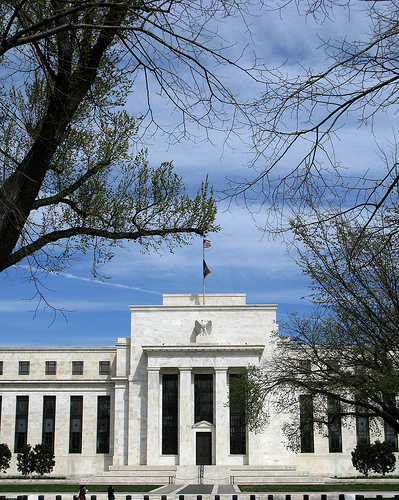
Flickr/<a href="http://www.flickr.com/photos/donshall/3414353911/">origamidon</a>
An amendment mandating an audit this year of the Federal Reserve and its multitrillion-dollar bailout resoundingly passed the Senate today, in a 96-0 vote. The audit, to be conducted by the Government Accountability Office (GAO), the non-partisan investigatory arm of Congress, will dig into the Fed’s decision-making and actions since the onset of the financial crisis in 2007. To date, the Fed has spent nearly $3.5 trillion trying to backstop teetering megabanks, housing giants Fannie Mae and Freddie Mac, and the secondary mortgage markets as a whole. Nearly all of these actions have taken place in almost complete secrecy, with little disclosure of who’s received the Fed’s extraordinary support and why.
The Fed audit approved today, authored by Sen. Bernie Sanders (I-Vt.), would require that the GAO post online a report by December 1 of this year outlining all of the Fed’s rescue measures. The GAO, Sanders has said, would also shed light on meetings between Fed officials and Wall Street CEOs which took place with alarming frequency in late 2008 and 2009. Those meetings posed serious conflict of interest issues when Fed officials like Stephen Friedman, head of the New York Fed, met with top brass from Goldman Sachs about converting the firm into a bank holding company; Friedman happens to be a Goldman Sachs board member as well. “This amendment begins the process of lifting the veil of secrecy at perhaps the most powerful federal agency there is,” Sanders told reporters today.
Originally, Sanders’ amendment called for periodic audits of the Fed by the GAO. But after facing considerable pressure from Senate Democratic leaders, like Chris Dodd (D-Conn.), and the White House, Sanders agreed to limit the amendment to one audit of the Fed’s bailouts, beginning in 2007. Asked whether he felt his amendment had been fundamentally weakened by limiting the number of audits, Sanders said he was optimistic that a successful initial investigation could spur the public to demand new audits. Sanders said, “They’re going to say, ‘You know what? We want more. We want more transparency.'”















